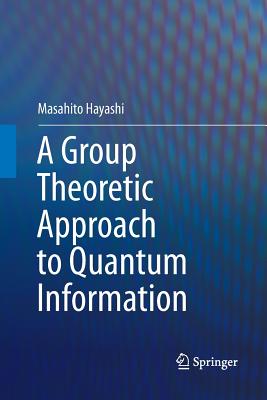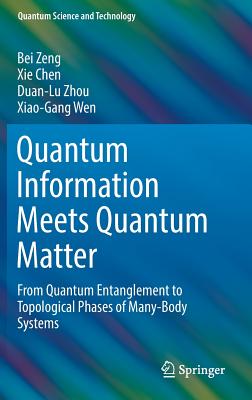A Group Theoretic Approach to Quantum Information (Paperback)
暫譯: 量子資訊的群論方法 (平裝本)
Hayashi, Masahito
- 出版商: Springer
- 出版日期: 2018-06-28
- 售價: $2,220
- 貴賓價: 9.5 折 $2,109
- 語言: 英文
- 頁數: 228
- 裝訂: Quality Paper - also called trade paper
- ISBN: 3319832484
- ISBN-13: 9783319832487
-
相關分類:
量子計算
-
其他版本:
A Group Theoretic Approach to Quantum Information
立即出貨 (庫存=1)
買這商品的人也買了...
-
 Quantum Field Theory : A Modern Perspective (Hardcover)
Quantum Field Theory : A Modern Perspective (Hardcover)$5,410$5,301 -
 Topology and Geometry for Physicists (Paperback)
Topology and Geometry for Physicists (Paperback)$840$823 -
 Quantum Field Theory for the Gifted Amateur (Paperback)
Quantum Field Theory for the Gifted Amateur (Paperback)$2,500$2,450 -
 $792Path Integrals and Quantum Processes (Paperback) (封底也些許折痕,不介意在下單)
$792Path Integrals and Quantum Processes (Paperback) (封底也些許折痕,不介意在下單) -
 The Quantum Mechanics of Many-Body Systems, 2/e (Paperback)
The Quantum Mechanics of Many-Body Systems, 2/e (Paperback)$940$893 -
 Mathematics for Physicists (Paperback)
Mathematics for Physicists (Paperback)$670$656 -
 Linear Algebra Done Right, 3/e (Hardcover)
Linear Algebra Done Right, 3/e (Hardcover)$2,370$2,251 -
 Holographic Duality in Condensed Matter Physics (Hardcover)(書側有些許黴斑,不介意在下單)
Holographic Duality in Condensed Matter Physics (Hardcover)(書側有些許黴斑,不介意在下單)$1,400$1,372 -
 Heat Conduction, 3/e (Hardcover)
Heat Conduction, 3/e (Hardcover)$1,960$1,920 -
 Holographic Entanglement Entropy (Lecture Notes in Physics)
Holographic Entanglement Entropy (Lecture Notes in Physics)$2,810$2,753 -
 The Theory of Quantum Information (Hardcover)
The Theory of Quantum Information (Hardcover)$1,680$1,646 -
 CPS 新一代工業智慧
CPS 新一代工業智慧$500$490 -
 Foundations of Differentiable Manifolds and Lie Groups
Foundations of Differentiable Manifolds and Lie Groups$2,860$2,802 -
 Differential Forms with Applications to the Physical Sciences
Differential Forms with Applications to the Physical Sciences$780$764 -
 Principles of Digital Communication (Paperback)
Principles of Digital Communication (Paperback)$980$960 -
 What Is a Quantum Field Theory? (Hardcover)
What Is a Quantum Field Theory? (Hardcover)$1,800$1,764 -
 C# 最強入門邁向頂尖高手之路王者歸來
C# 最強入門邁向頂尖高手之路王者歸來$980$774 -
 Gauge Theory and Variational Principles
Gauge Theory and Variational Principles$720$705 -
 Introduction to Linear Algebra, 6/e (Paperback)
Introduction to Linear Algebra, 6/e (Paperback)$1,300$1,274 -
 Quantum Systems, Channels, Information: A Mathematical Introduction
Quantum Systems, Channels, Information: A Mathematical Introduction$10,410$10,201 -
 Black Hole Physics: From Collapse to Evaporation (Graduate Texts in Physics) 1st ed. 2022 Edition
Black Hole Physics: From Collapse to Evaporation (Graduate Texts in Physics) 1st ed. 2022 Edition$2,810$2,753 -
 史上最強 Python 入門邁向頂尖高手之路王者歸來, 3/e (全彩印刷)
史上最強 Python 入門邁向頂尖高手之路王者歸來, 3/e (全彩印刷)$1,200$948 -
 Representations of Linear Groups: An Introduction Based on Examples from Physics and Number Theory (Paperback)
Representations of Linear Groups: An Introduction Based on Examples from Physics and Number Theory (Paperback)$3,000$2,940 -
 Quantum Geometry, Matrix Theory, and Gravity (Hardcover)
Quantum Geometry, Matrix Theory, and Gravity (Hardcover)$1,780$1,744 -
 Field Theory: A Modern Primer
Field Theory: A Modern Primer$1,980$1,881
商品描述
This book is the first one addressing quantum information from the viewpoint of group symmetry. Quantum systems have a group symmetrical structure. This structure enables to handle systematically quantum information processing. However, there is no other textbook focusing on group symmetry for quantum information although there exist many textbooks for group representation. After the mathematical preparation of quantum information, this book discusses quantum entanglement and its quantification by using group symmetry. Group symmetry drastically simplifies the calculation of several entanglement measures although their calculations are usually very difficult to handle. This book treats optimal information processes including quantum state estimation, quantum state cloning, estimation of group action and quantum channel etc. Usually it is very difficult to derive the optimal quantum information processes without asymptotic setting of these topics. However, group symmetry allows to derive these optimal solutions without assuming the asymptotic setting. Next, this book addresses the quantum error correcting code with the symmetric structure of Weyl-Heisenberg groups. This structure leads to understand the quantum error correcting code systematically. Finally, this book focuses on the quantum universal information protocols by using the group SU(d). This topic can be regarded as a quantum version of the Csiszar-Korner's universal coding theory with the type method. The required mathematical knowledge about group representation is summarized in the companion book, Group Representation for Quantum Theory.
商品描述(中文翻譯)
這本書是第一本從群對稱的角度探討量子資訊的書籍。量子系統具有群對稱結構。這種結構使得系統性地處理量子資訊處理成為可能。然而,儘管存在許多關於群表示的教科書,卻沒有其他教科書專注於量子資訊的群對稱。在對量子資訊進行數學準備之後,本書討論了量子糾纏及其通過群對稱的量化。群對稱大幅簡化了幾個糾纏度量的計算,儘管這些計算通常非常難以處理。本書處理了最佳資訊過程,包括量子狀態估計、量子狀態克隆、群作用的估計和量子通道等。通常,在沒有這些主題的漸近設定下,推導最佳量子資訊過程是非常困難的。然而,群對稱允許在不假設漸近設定的情況下推導這些最佳解。接下來,本書探討了具有Weyl-Heisenberg群對稱結構的量子錯誤更正碼。這種結構使得系統性地理解量子錯誤更正碼成為可能。最後,本書專注於使用群SU(d)的量子通用資訊協議。這個主題可以被視為Csiszar-Korner的通用編碼理論的量子版本,並使用類型方法。關於群表示所需的數學知識已在伴隨書籍《量子理論的群表示》中進行總結。
作者簡介
Masahito Hayashi was born in Japan in 1971. He received the B.S. degree from the Faculty of Sciences in Kyoto University, Japan, in 1994 and the M.S. and Ph.D. degrees in Mathematics from Kyoto University, Japan, in 1996 and 1999, respectively.
He worked in Kyoto University as a Research Fellow of the Japan Society of the Promotion of Science (JSPS) from 1998 to 2000, and worked in the Laboratory for Mathematical Neuroscience, Brain Science Institute, RIKEN from 2000 to 2003, and worked in ERATO Quantum Computation and Information Project, Japan Science and Technology Agency (JST) as the Research Head from 2000 to 2006. He also worked in the Superrobust Computation Project Information Science and Technology Strategic Core (21st Century COE by MEXT) Graduate School of Information Science and Technology, The University of Tokyo as Adjunct Associate Professor from 2004 to 2007. He worked in the Graduate School of Information Sciences, Tohoku University as Associate Professor from 2007 to 2012. In 2012, he joined the Graduate School of Mathematics, Nagoya University as Professor. He also worked in Centre for Quantum Technologies, National University of Singapore as Visiting Research Associate Professor from 2009 to 2012 and as Visiting Research Professor from 2012 to now. In 2011, he received the Information Theory Society Paper Award (2011) for Information-Spectrum Approach to Second-Order Coding Rate in Channel Coding. In 2016, he received the Japan Academy Medal from the Japan Academy and the JSPS Prize from Japan Society for the Promotion of Science.
He is a member of the Editorial Board of the International Journal of Quantum Information and International Journal On Advances in Security. His research interests include classical and quantum information theory, information-theoretic security, and classical and quantum statistical inference.
作者簡介(中文翻譯)
Masahito Hayashi 於1971年出生於日本。他於1994年獲得日本京都大學理學學士學位,並於1996年和1999年分別獲得京都大學數學碩士和博士學位。
他於1998年至2000年在京都大學擔任日本學術振興會(JSPS)研究員,並於2000年至2003年在理化學研究所(RIKEN)數學神經科學實驗室工作,接著於2000年至2006年在日本科學技術振興機構(JST)擔任ERATO量子計算與資訊專案的研究負責人。他還於2004年至2007年在東京大學資訊科學與技術研究所的超穩健計算專案(21世紀COE,由文部科學省主辦)擔任兼任副教授。2007年至2012年,他在東北大學資訊科學研究所擔任副教授。2012年,他加入名古屋大學數學研究所擔任教授。他還於2009年至2012年在新加坡國立大學量子技術中心擔任訪問研究副教授,並於2012年至今擔任訪問研究教授。2011年,他因在通道編碼中的資訊頻譜方法獲得資訊理論學會論文獎(2011)。2016年,他獲得日本學士院獎章及日本學術振興會獎。
他是《國際量子資訊期刊》和《國際安全進展期刊》的編輯委員會成員。他的研究興趣包括經典與量子資訊理論、資訊理論安全,以及經典與量子統計推斷。










